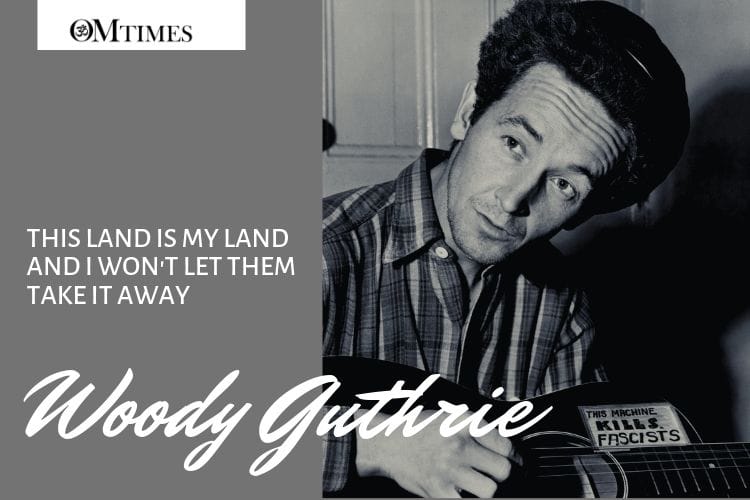Woody Guthrie: This Land is My Land

This land is your land, this land is my land, from California to New York island, from the redwood forest to the Gulf Stream waters, this land was made for you and me. ~ Woody Guthrie
Woody Guthrie: This Land is my Land and I Won’t Let Them Take it Away
Woodrow Wilson Guthrie (1912-1967) whose birth anniversary we note on 14 July, was the voice of the marginalized, especially those hit by the drought in the west of the U.S.A. during the late 1920s-early 1930s – what has been called the “dust bowl”.
Many lost their farms due to unpaid bank loans, and others moved to the greener pastures of California, where they were not particularly welcomed. However, nearly all were U.S. citizens, and they could not be deported to another country.
Times have changed. Today, there are the homeless who would like to reach the U.S.A. There has been a good deal of media attention given to those at the frontier, including those who have died trying to reach the U.S.A.
Less media attention has been given to those living in the U.S. and who are being deported to their “home country” although some have been living in the U.S. since childhood and could sing “This land is my land.”
A large number of persons, an estimated three million, were deported during the 8-year presidency of Barack Obama with relatively little attention given except by specialists. The more flamboyant speeches of President Trump have awakened more people to the issue of deportation and the conditions in which people are held prior to deportation.
Those in danger of deportation are not organized in a formal way. The U.S. trade union movement is a weak organizational force whose membership has vastly declined. In practice, trade unions never fought to protect “illegal” foreign workers even when trade unions were stronger. There are legitimate, non-racist concerns that an influx of immigrants will lower wage rates and overburden welfare services. These non-racist concerns join in with the noisier, racist-voices.
Opposition to deportation has come largely from religious-spiritual groups stressing human dignity and using places of worship as sanctuaries in which to house people in danger of deportation. This sanctuary movement began in the early 1980s to provide safe-havens for Central American refugees fleeing civil armed conflicts. Obtaining refugee status and asylum in the U.S. was difficult. Some 500 congregations joined the sanctuary movement to shelter people based on the medieval laws which protected church building against soldiers. Other congregations used the image of the Underground Railroad which protected runaway slaves prior to the Civil War.
There is now a new sanctuary movement in the Age of Trump, focused on the protection of undocumented families from the newly created police of the U.S. Immigration and Customs Enforcement (ICE). Woody Guthrie would no doubt lend his singing voice to help those in danger of deportation as he did for the farmers and workers of the 1930s.
You will also enjoy How Not To Go To War
About the Author
Rene Wadlow is the President of the Association of World Citizens, an international peace organization with consultative status with ECOSOC, the United Nations organ facilitating international cooperation and problem-solving in economic and social issues, and editor of Transnational Perspectives.
Rene Wadlow is the President of the Association of World Citizens, located in Geneva, Switzerland.





